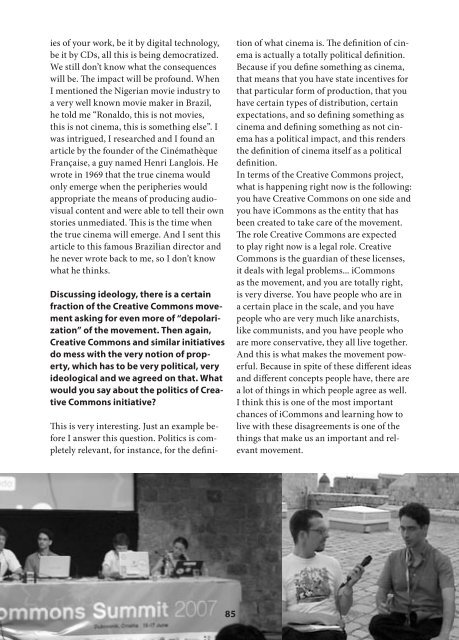You also want an ePaper? Increase the reach of your titles
YUMPU automatically turns print PDFs into web optimized ePapers that Google loves.
ies of your work, be it by digital technology,<br />
be it by CDs, all this is being democratized.<br />
We still don’t know what the consequences<br />
will be. The impact will be profound. When<br />
I mentioned the Nigerian movie industry to<br />
a very well known movie maker in Brazil,<br />
he told me “Ronaldo, this is not movies,<br />
this is not cinema, this is something else”. I<br />
was intrigued, I researched and I found an<br />
article by the founder of the Cinémathèque<br />
Française, a guy named Henri Langlois. He<br />
wrote in 1969 that the true cinema would<br />
only emerge when the peripheries would<br />
appropriate the means of producing audiovisual<br />
content and were able to tell their own<br />
stories unmediated. This is the time when<br />
the true cinema will emerge. And I sent this<br />
article to this famous Brazilian director and<br />
he never wrote back to me, so I don’t know<br />
what he thinks.<br />
Discussing ideology, there is a certain<br />
fraction of the Creative Commons movement<br />
asking for even more of “depolarization”<br />
of the movement. Then again,<br />
Creative Commons and similar initiatives<br />
do mess with the very notion of property,<br />
which has to be very political, very<br />
ideological and we agreed on that. What<br />
would you say about the politics of Creative<br />
Commons initiative?<br />
This is very interesting. Just an example before<br />
I answer this question. Politics is completely<br />
relevant, for instance, for the defini-<br />
85<br />
tion of what cinema is. The definition of cinema<br />
is actually a totally political definition.<br />
Because if you define something as cinema,<br />
that means that you have state incentives for<br />
that particular form of production, that you<br />
have certain types of distribution, certain<br />
expectations, and so defining something as<br />
cinema and defining something as not cinema<br />
has a political impact, and this renders<br />
the definition of cinema itself as a political<br />
definition.<br />
In terms of the Creative Commons project,<br />
what is happening right now is the following:<br />
you have Creative Commons on one side and<br />
you have iCommons as the entity that has<br />
been created to take care of the movement.<br />
The role Creative Commons are expected<br />
to play right now is a legal role. Creative<br />
Commons is the guardian of these licenses,<br />
it deals with legal problems... iCommons<br />
as the movement, and you are totally right,<br />
is very diverse. You have people who are in<br />
a certain place in the scale, and you have<br />
people who are very much like anarchists,<br />
like communists, and you have people who<br />
are more conservative, they all live together.<br />
And this is what makes the movement powerful.<br />
Because in spite of these different ideas<br />
and different concepts people have, there are<br />
a lot of things in which people agree as well.<br />
I think this is one of the most important<br />
chances of iCommons and learning how to<br />
live with these disagreements is one of the<br />
things that make us an important and relevant<br />
movement.


